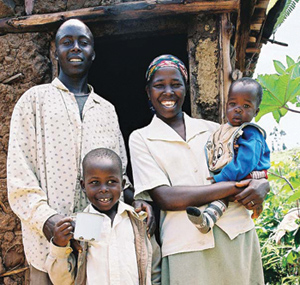For Consumers
Improving Access to HIV/AIDS Drugs Abroad
 Get Consumer Updates by E-mail
Get Consumer Updates by E-mail
Doug Shaffer/ PEPFAR 2007 Annual Report
Through HIV counseling and testing for couples at the U.S.-supported Kericho District Hospital in Africa, Joyce and David found out they were infected with HIV. Joyce was four months pregnant with her second child at the time of diagnosis. Thanks to the clinic's program to prevent mother-to-child HIV transmission, Joyce delivered a baby boy who is HIV negative. After a year of antiretroviral treatment, David gained weight and felt healthy, enabling him to provide for his family. Today, the family continues to do well.
|
 Share this article (PDF 410 K)
Share this article (PDF 410 K)
On this page:
Daniel Ngoshe, a father of six from Zambia, was unemployed when he found out he was HIV positive. But after starting drug treatment his strength increased, making it easier for him to work at home and in his community. He became an adherence support worker, training others with HIV to take their medications properly so they can also live healthier lives.
Ngoshe's experience is just one of many stories of hope made possible by the U.S. President's Emergency Plan for AIDS Relief (PEPFAR). Since it launched in 2003, PEPFAR has supported HIV/AIDS treatment for more than 3.9 million men, women and children worldwide, up from less than 3.2 million in 2010.
Antiretroviral treatment usually involves a combination of at least three drugs. This approach can dramatically reduce the number and severity of illnesses associated with HIV infection. It can also improve the duration and quality of life.
A Unique Approval Process
To support PEPFAR's goals, the Food and Drug Administration introduced an initiative in 2004 to ensure that antiretroviral drugs produced by manufacturers all over the world could be rapidly reviewed, their quality assessed, and their acceptability for purchase with PEPFAR funds supported.
As of July 2, 2012, FDA has approved or tentatively approved a total of 152 antiretroviral drugs in association with PEPFAR. Tentative approval means that although existing patents and/or marketing exclusivity prevent the product from being approved for marketing in the United States, FDA has found that the product meets all of the manufacturing quality, safety, and effectiveness requirements for marketing in the U.S.
This FDA initiative was necessary because of the large amount of counterfeit and substandard pharmaceutical products available in many of the countries served by PEPFAR. The PEPFAR program sought to ensure that people receiving treatment were given quality products that would treat their diseases. A substandard product could not only be ineffective, but could possibly worsen the situation by stimulating the development of drug-resistant strains of the virus that causes HIV/AIDS.
"FDA set out to help PEPFAR make safe, effective, and lower-cost antiretroviral drugs available in the countries served by the plan," says Justina Molzon, MSPharm., J.D., associate center director for international programs in FDA's Center for Drug Evaluation and Research. "In May 2004, we published a draft guidance encouraging manufacturers to submit applications of fixed-dose combination and co-packaged versions of previously approved antiretroviral therapies."
A fixed-dose combination has two or three drugs in a single tablet. A co-packaged product contains two or three tablets in a single package. "We encouraged these particular regimens for ease of use," Molzon says. "They simplify treatment, which can be a stumbling block for many people with HIV who find it difficult to maintain a regimen of several drugs."
FDA experts traveled to South Africa and India to discuss the guidance with drug manufacturers. The agency invited manufacturers to submit applications for combination and co-packaged products, even if they were not already approved and available in the United States. Additionally, FDA's activities help make lower-priced generic versions of already approved and proven drugs available for purchase with PEPFAR funds, stretching resources to treat more people with HIV.
Patents and/or marketing exclusivity protect drug companies' investments by giving them the sole right to sell the drug in the country where the patent and/or marketing exclusivity is still in effect. FDA's assessment process helps make the drugs available in developing countries without violating the property rights of drug companies in the United States.
"For the generic antiretrovirals that can be marketed in the United States, full approval is granted," Molzon says. "But for those that cannot be marketed in the United States due to existing patent and/or exclusivity protection, a so-called "tentative" approval is granted."
Only antiretroviral drugs that are approved or tentatively approved are eligible for purchase with PEPFAR funds in developing countries. Due to the significant public health impact of these products, FDA gives priority to the review of these submissions.
Recent Approvals
Examples of recent FDA tentative approvals under the program are:
- Efavirenz tablets: In June 2012, FDA announced the tentative approval of Efavirenz tablets for adults initiating treatment of HIV. Efavirenz is a component of one of the preferred regimens for first-line treatment. This was the 150th product tentatively approved for PEPFAR and is manufactured by Edict Pharmaceuticals.
- Lamivudine and Zidovudine tablets for oral suspension: In June 2012, FDA announced tentative approval for this fixed-dose combination tablet for children, containing two components of an HIV regimen. The tablets can be suspended in liquid for children who are unable to swallow them. They are manufactured by Cipla Ltd.
For a complete list of drugs with full or tentative approval under the program, visit FDA's PEPFAR page.
This article appears on FDA's Consumer Updates page, which features the latest on all FDA-regulated products.
Updated: July 23, 2012









